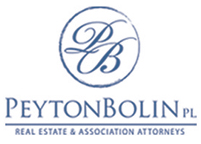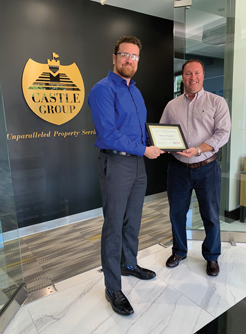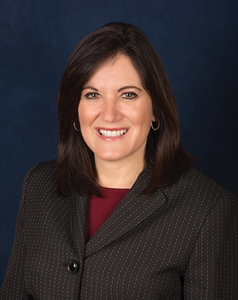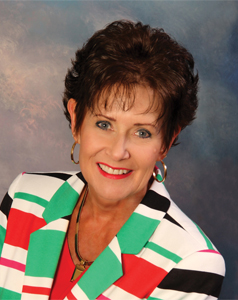
FCAP Community
Published July 2019
Florida Community Association Professionals’ (FCAP) training is offered on two levels. Level one consists of courses meeting Florida’s continuing education requirements for CAMs, and level two is the Florida Advanced CAM Studies (FACS) course. For further information about the more than 50 online continuing education classes available or to pursue the Certified Florida Community Association Manager (CFCAM) designation, please visit www.fcapgroup.com/membership/education-training/.
FCAP Congratulates Brian Packard—The Newest CFCAM
On March 26, Brian Packard, owner of Kingsland Property Management, was the latest community association manager to obtain his Certified Florida Community Association Manager (CFCAM) designation.
Although he began his career in real estate, receiving his license in 2002, Brian has had an accomplished career in the community association management industry. Brian became a licensed CAM in 2006. From 2006 to 2013, Brian worked for Ambassador Community Management and was a co-manager for 60 condominiums and homeowner associations. While with Ambassador Community Management, Brian worked on his degree in business administration from Nova Southeastern University, which he received in 2014. Also, in 2014, Brian started work as a property manager for Haag Property Management Company and managed four high-end homeowner associations. Following his time with Haag Property Management Company, Brian became the property manager at the Sea Ranch Club Condominiums, where he had many successes. While with Sea Ranch, Brian saved the association more than four million dollars as a result of taking over budget duties. In addition, within two years of managing the association, the building was saving money on its energy and water consumption and all building equipment was at peak performance. Brian is an example of excellence in the industry.
Congratulations again to Brian on obtaining his CFCAM designation!
What Issues Are Community Association Managers Facing in 2019?
The first issue I see facing community association mangers has to do with addressing the proper— and in some cases, necessary—fire safety standards for their communities, even though it appears the state is not going to mandate it. The second issue I see is iguanas!
Why Did You Decide to Become a CAM?
During what I consider a successful career in customer service, I was providing my services and support to five portfolio CAMs. After a while, I said to myself, “I’m pretty good at this property management gig and feel a passion for it,” so I obtained my license and made it my profession.
What Led to Your Decision to Pursue the CFCAM Designation?
This was a no-brainer on my end. Property management is not just a job for me; it is my passion and my profession. If you truly want to excel at something in life, you should always obtain all the knowledge, experience, and expertise needed for success.
What Is the Most Rewarding Aspect of Your Job?
The sense of satisfaction I get in helping communities prosper and reach their full potential. For me, it’s like taking a lump of clay and turning it into a work of art.
Sample Staff Hurricane Preparations
Plan & Checklist For High-Rise Condominium Associations
Marcy L. Kravit, CMCA, AMS, PCAM, CFCAM
FCAP Education and Training Coordinator
AKAM ON-SITE Managing Director
Every June through November, we enter into the hurricane season. Below is a sample staff hurricane preparedness plan.
In South Florida, we have learned from experience it is critical to be prepared each and every time the National Hurricane Center predicts severe weather. If you and your staff prepare the common areas well ahead of the event, you will minimize damage and ultimately reduce costs in clean-up and recovery for your association.
By following this checklist, you will be better prepared to meet the challenges that you may be faced with at some point from a storm. Prepare your association early so that when a storm is approaching, you are well protected and ready. Communicate with your association and board in advance, and your team will be well prepared!
Purchase Supplies:
- First aid kits should be refilled,
- Flashlights
- Batteries
- Tape, rope, caution tape, portable radios
- Two-way communication tested and connected to generator
- Plastic, tarps
- Sandbags—they make sandless flood bags that work well
- Inventory and purchase necessary items to secure the association amenities. Items include plastic bags, duct tape, screws, washers, bolts, flashlights, batteries, cell phone, charger, camera, film, gloves, goggles, and a rain jacket.
- Ensure that all propane gas cans are filled and purchase additional storage containers and gas if necessary. Check lubricants and oils for chain saws and tree trimmers as well.
Check and Inspect Backup Systems:
- Emergency lighting, telephone, exit signs, fire/smoke alarms, sump pumps, smoke fans, emergency generator, wet vacs, fans, etc.
Assign Duties
Maintenance and Housekeeping Responsibilities:
- Check battery and generator backup.
- Remove pool furniture, umbrellas, grill and items from common areas, trash cans, potted plants, etc.
- Fill up ice machine and bag ice.
- Remove loose landscaping materials and debris from property.
- Turn off electrical power to pool and turn off pool pumps, motors, and heaters.
- Shut off fountain(s).
- Super-chlorinate the pool. Lower the water level. Close the skimmer valve.
- Clean all drains throughout property and remove all debris from garage, including rooftop drains.
- Activate and inspect emergency lighting.
- Check that the fire alarm, smoke alarms, smoke fans, and telephone are powered by generator back-up.
- Disconnect the television satellites or any other antennas where they enter the property to prevent lightning damage to amplifiers and televisions.
- Shut down pumps and HVAC systems. Turn off AC and all pumps, and close all valves. Once evacuations are complete, the AC, pumps, and air handlers should be manually turned off at the thermostat control panel or disconnected.
- Turn off the main connection in the telephone room.
- Make sure the generator switch is in the off position. Turn off the main circuit for the rest of the building.
- Use designated fire stairwell to return to a higher floor.
- Remove globes from all post lights on property.
- Check common areas for removal of plants, tables, etc.
- Verify all two-way radios are working.
- Place gates in open position.
- Remove, relocate, or secure bicycles.
- Shut down and disconnect fitness room equipment.
- Secure dumpsters and remove items from dumpster room floor.
- Shut down main gas and water valves and tag. Disconnection/shut down occurs at a scheduled time, and residents should be given advance notice. Be sure the fire department’s water is left on.
- Set elevators at higher floors to prevent flood damage. Ensure that all elevator mechanical rooms are secure and that door jambs are taped to prevent wind and rainwater damage.
- Utilize staff to assist in closing unit owner shutters and removing balcony furniture, plants, tables, etc.
- Secure roof and cooling tower.
- Place sandbags throughout the building.
Security/Front Desk Responsibilities
- Ensure that flashlights are working. Print out current owner roster and vendor roster to include cell phone numbers.
- Review schedule of shifts and communicate to staff for before and after the storm.
- Secure front doors.
- Inspect surveillance cameras’ equipment.
- Secure cones, barricades, and all equipment in a secure location.
- Assist in delivery of owner evacuation notification.
- Maintain security and safety of residents and staff.
- Secure unit owners’ and common areas’ keys.
- Video all areas prior to storm.
Administrative Responsibilities
- Unplug all desk and electrical appliances.
- Move all equipment away from windows.
- Cover all computers with plastic and back up information.
- Secure all documents, insurance records, banking records, insurance agent contact info, and resident and owner files.
- Power down computers and all electronic office equipment. Move these items off the floor and away from the windows.
- Secure petty cash should funds need to be available for emergency supplies, and obtain gasoline for gas-powered equipment.
- Assist in communicating to residents all phases of preparations, evacuation, and recovery after the storm.
- Cover file cabinets and furniture with plastic.
- Obtain a list of residents who are only present part time (snowbirds) and ensure you have keys to these units in the event that mitigation of damages is necessary. It is also a good idea to maintain email addresses of all residents in order to notify them after an event of the condition of the property.
Chronological Timeline
Beginning of Hurricane Season
- Draft/post/email a unit owner hurricane season resident guide.
- Obtain a local hurricane guide. Most local municipalities produce hurricane preparedness guides that include evacuation plans, shelter locations, important contact numbers, survival kit recommendations, and more. The association should consider obtaining copies of these guides and making them available to residents.
- Review the association’s insurance coverage and emergency numbers. Be ready to accumulate information to expedite filing of any necessary claims.
- Update resident roster and obtain information as to who is in residence (full-time residents vs. seasonal residents) and who will be staying—noncompliance with mandatory evacuation—if there is a mandatory evacuation. Explain they will not have assistance and building will be shut down, with no AC, water, elevators, or emergency medical services.
- Schedule tree trimming in or before June.
- Review insurance deductibles and documents in or before June.
- Make arrangements with contractors who will be of assistance in case of an event. Vendors include lawn service, tree trimmers, glass companies, waste management and water officials, plumber, electrician, etc.
- Review procedures with association board of directors and staff.
96 Hours Before Hurricane
- Meet with staff.
- Access www.nhc.noaa.gov to track the progress and projected path of the upcoming hurricane.
- Review and complete a hurricane checklist.
- Review and print off a current association spec sheet.
- Ensure that all numbers are accurate, including lawn service, plumber, employees, electrician, etc.
- Keep updated copy in a hurricane binder.
- Take photos of property prior to the storm.
- Review plan and procedures with the BOD.
- Assemble and post notices including an emergency evacuation plan.
- Request all employees be personally prepared 72 hours prior to an event.
72 Hours Before Hurricane
- Examine common areas and identify possible problems that could become projectiles. Items include signs, grills, lounge chairs, plants, garbage cans, ash trays, newspaper stands, light fixtures, globes, and any loose items around the property.
- Make storage arrangements for above items.
- Do not trim trees or create any debris that cannot be safely removed or secured prior to a storm.
- Ensure there is a sufficient supply of banding, clips, duct tape, tarps, and sandbags as well as the manpower to accomplish preparations.
- Ensure all items are stored and any potential “projectiles” stored in a safe area.
- Inspect and repair, if needed, the door locks on all doors.
- Confirm that all emergency contact information is current.
- Confirm all pumps and generators are in working order.
48 Hours Before Hurricane
- Ensure that all supplies and necessary materials have been purchased and are on site.
- Begin to secure personal property located throughout the association. A minimal number of items should be left out on the property that can quickly and easily be stored.
- Secure compactors and recycle with rope.
- Meet with staff to ensure that areas are secure and that staff is informed and ready in case of an event.
- Install shutters and complete boarding windows and openings without shutters.
24–36 Hours Before Hurricane
- Shut off irrigation system.
- Have pool lowered 12–24 inches.
- Shut off pumps and fountains in association.
- Store condominium hallway fire extinguishers in the storage area under the steps in each building.
- Secure all doors.
- Back up all data on local hard drives.
- Secure all office files and move items away from windows.
- Cover all sensitive equipment, including computers, monitors, keyboards, tower, copiers, fax machines, and all other electrical equipment. Keep equipment a minimum of 12 inches off of the floor.
- Move and store all portable equipment, books, files, and binders at least 12 inches off the floor.
- Contact BOD liaison to ensure that emergency evacuation plan is in force and confirm expected shutdown time.
- Provide up-to-date telephone emergency contact information to the BOD.
Post-Hurricane Activity
- Create a list of storm damage from on-site inspection.
- Keep in mind Section 718.1265 of the Florida Statutes provides associations with specific powers in the event of an emergency (such as after a hurricane).
- Check on status and confirm association vendors’ and board members’ contact info:
- Association president
- Lawn and irrigation contractor(s)
- Restoration company
- Plumber
- Pool company
- CPA
- Insurance agent
- Attorney
- Glass
- Locksmith
- Elevators
- Take photos of property and develop a list of remediation requirements.
- Contact outside contractors as required
- Complete emergency remediation
- Coordinate clearing of debris from storm sewers
- Coordinate removal of fallen palm fronds
- Coordinate return of property to normal operations:
- Maintenance—turn on fountains; check irrigation system.
- Lawn contractor/maintenance—clear fallen trees & debris.
- Maintenance—check all streetlights & signs.
- Maintenance—return stored items.
- Communication plan.
Because You Asked
By Betsy Barbieux, CAM, CFCAM
Betsy,
I have another question regarding the condominium association that I have been working with. When I was hired as their interim CAM, my dad’s pool maintenance business already had his maintenance staff working on the property. I interviewed for the permanent CAM position, but I was told by two of the board members that if they hire me permanently, they will fire my dad’s company because it is nepotism. I do write the checks for the association, but they are signed by two board members. I am also not affiliated in any way with his company, nor do they make any additional money other than what is in the approved contract for extra projects. So, my question is, would this really be considered nepotism the way it is structured now? If I incorporated and got a CAM firm license, would I be able to use his company? This is a self-managed board, and the bookkeeping is done off site and the CAM is on site. Any advice or opinion would be appreciated.
– Bonnie
Bonnie,
It is not actually nepotism, but it could be perceived as a conflict of interest. Conflicts of interest in the statutes are usually referring to board members and their relationships with vendors. The procedures in Florida Statutes, Section 718.111(3) and Section 718.112(2)(p), for handling conflicts of interest seem to contradict each other.
Generally, perceived conflicts of interest can be overcome with disclosure written into the minutes. To me, it seems this one would be “easy” since your dad’s company was a vendor before you were hired.
Forming a management company firm will not make the situation any better. If the board is in doubt, check with your attorney.
– Betsy
Betsy,
Can a board member resign from the board via email and then two days later rescind the resignation?
– Dawn
Dawn,
It might depend on the wording of the email. Did he resign as of that day or a date in the future? It seems that if the board met during those two days and acknowledged the resignation, it would be noted in the minutes, and it would be a done deal and not able to be rescinded.
The board then has a vacancy to fill, so I guess they could appoint the board member who resigned (or appoint anyone else willing to serve for the remainder of that term). All this seems a little convoluted.
– Betsy
Betsy,
Quick question! What is the difference between CMCA—Certified Manager of Community Associations —and CAM? Or, should I ask that at the class?
– Brittany
Brittany,
You can ask in class, but the CMCA is a certification offered by CAI National. It has nothing to do with the Florida CAM license. In order to manage any type of community association in Florida, you must be licensed by the state of Florida’s Department of Business and Professional Regulation (DBPR) and have a current CAM license.
The CMCA certification takes you through a basic management course, and I would certainly encourage anyone to strive for that certification but not before you have received your CAM license. The information in the CMCA course, in some parts, contradicts Florida law. So, you need to get your CAM license first, so you don’t get confused about what is a good best practice and what is Florida law.
– Betsy
Betsy,
Thank you for your prompt reply, but I would appreciate revisiting one thing that you said earlier, which is whether or not the property manager should be sitting in when the fining committee meets.
I believe you said either that this is now allowed or that you do not allow it. I would appreciate your clarifying this matter.
– Al
Al,
The condominium statute, 718.303(3)(b), says that an employee of the association may not be on the fine (appeals) committee. So, the manager should not be on the committee.
As far as the manager attending the meeting, I see no reason for the manager to be there. The one time that our manager did attend our fine (appeals) committee meeting, it ended up in a two-way (heated) conversation between the manager and the angry owner rather than a one-way. The owner argued with the manager, which is not the point of the appeals hearing. In my view, it is a one-way conversation. It is the owner stating why he or she thinks the fine or suspension imposed by the board at the previous board meeting should not be upheld. At the earlier board meeting where the violation and fine were discussed, the owner had the opportunity to argue his case when the facts were presented by the manager to the board. The sole purpose of the fine (appeals) committee is to affirm or reject the fine previously imposed by the board.
– Betsy
FCAP Member’s Spotlight

Absolute Patio Furniture Restoration
Absolute Patio Furniture Restoration is a division of Absolute Powder Coating, which is a leader in the architectural industry. They specialize in patio furniture restoration for hotels, condominiums, country clubs, designers, homeowners, and manufacturers. Their process includes sandblasting to remove existing finish and surface corrosion, chemical pretreatment, and a two-stage powder coating system for ultimate performance. They offer a large selection of colors and textures and are certified refinishers for some of the largest furniture manufacturers in the country. They are certified by the American Architectural Manufacturers Association (AAMA).
For more information, call (954) 917-2715 or visit www.absolutepowdercoat.com.

PeytonBolin PL
PeytonBolin PL is a law firm dedicated to enriching the community association industry through legal counsel and education. Community association law is more than just collections (and collections are important to keep cash flow and revenue moving)! We provide the guidance and strategy for boards and managers to produce the kind of community they are committed to. Not every association wants the same thing, and not every law firm is the right fit. We are looking for clients who want to work collaboratively with us to produce results! We provide innovative billing structures to help associations achieve their goals. Board and manager education makes a difference. Join us for classes online and in person. Be sure to check out Jane F. Bolin’s book Mastering the Business of Your Association, which can be found on Amazon!
For more information, call (877) 739-8662 or visit www.peytonbolin.com.
 Rick Carroll
Rick Carroll
Founded in 1957, Rick Carroll Insurance is a full-service agency comprised of commercial, group benefits, and personal insurance. We are a team of dedicated professionals providing clients with a superior level of customer service, separating us from our competitors. Accessibility, promptness, and accuracy are qualities we strive for each day. To meet these goals, we have a live operator, no automated attendants; we utilize state-of-the-art technology; and e-mails and phone inquiries are responded to quickly. Our staff maintains current knowledge through frequent training and attendance of continuing education courses. We have developed the expertise required to understand and handle the cyclical nature of the insurance marketplace and utilize a consultative approach to provide a solutions-based insurance program that meets your needs.
For more information, call (772) 334-3181 or visit www.rickcarroll.com.






